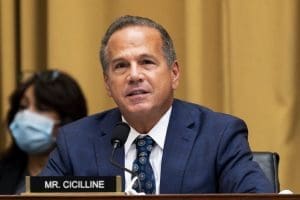Intersex advocates call Equality Act a 'tremendous step forward'
Explicit protections for intersex people are included in the bill.

The Equality Act, a bill that provides nondiscrimination protections for LGBTQ people, was reintroduced in the House of Representatives last week. The bill, introduced by Rep. David Cicilline (D-RI) and co-sponsored by 224 members of Congress, prohibits discrimination against LGBTQ people in housing, education, employment, health care, credit, public accommodations, and jury service.
The bill also provides explicit protections for intersex people against discrimination in all of these areas. The definition of sex in the bill includes “sex characteristics, including intersex traits,” a big win for the intersex community.
Like LGBTQ people, many intersex people, or people who were born with differences in their sex traits and reproductive anatomy that don’t fall within the typical definitions of “male” and “female,” also experience harassment and discrimination, including those who are part of the LGBTQ community.
InterACT: Advocates for Intersex Youth, working alongside the Human Rights Campaign and the ACLU, advocated for the inclusion of the language about intersex people in the version of the Equality Act that was introduced and passed in the House in 2019.
The passage of the bill in the current Congress is anything but guaranteed, however: Senate Republicans could try to use the filibuster to block the bill. Some Republicans have already stated their opposition, according to the Washington Blade. It’s also unclear whether Sen. Joe Manchin (D-WV) would support it. He did not support the bill in 2019.
“Advocates for Intersex Youth is thrilled to have ensured intersex inclusion in the Equality Act, making explicit the widespread conclusion that discrimination on the basis of sex includes discrimination on the basis of a person’s sex characteristics,” said Alesdair Ittelson, director of law and policy at InterACT. “This legislation is a tremendous step forward, and we enthusiastically await its passage and are deeply grateful to all who helped make it a reality.”
President Joe Biden to sign an executive order on his first day in office ordering all federal agencies to implement the Supreme Court’s decision in Bostock v. Clayton County last year’s landmark Supreme Court decision establishing that LGBTQ people are included in prohibitions of sex-based employment discrimination in federal law.
It is interACT’s position that sex discrimination “inherently includes discrimination on the basis of sex characteristics.” However, Ian Thompson, a senior legislative representative for the ACLU, explained that Equality Act would be helpful for securing intersex people’s rights because it would “make it clear that Congress wants these protections to apply to intersex people.”
The Equality Act would also provide protections beyond what is currently covered by federal law in prohibitions against sex discrimination, such as in public accommodations.
“Making protections for intersex people explicit is an important step to ensure no one experiences discrimination because of who they are,” Thompson said.
Ittelson said he is hopeful that passage of the Equality Act will lead to more advances for intersex people, including eventually prohibiting surgical interventions on intersex infants, who are obviously too young to consent.
“These surgeries have been deemed a form of torture by the United Nations and are condemned by every human rights organization to have considered the issue,” Ittelson said.
Kimberly Zieselman, executive director of interACT, said there has been some progress in the past few years in recognition for intersex people. On the federal level, Zieselman said, the Obama administration began to make strides on intersex people’s rights when the State Department created the position of envoy for LGBTQ and intersex people in 2015.
Zieselman called the fact that Biden’s Feb. 4 memorandum to federal agencies on advancing LGBTQ rights across the globe mentions intersex people’s rights a “great first step,” but said there should also be recognition of the struggles of intersex people in the United States.
The Biden administration has also indicated that it may establish an “X” gender marker for use in federal documentation, although it has not estimated how long that may take, 19th News reported on Friday.
Intersex people face a number of similar threats to those being fought by members of the LGBTQ community, such as transgender sports bans. Zieselman explained that in many cases, sports bills could also harm intersex athletes: She says she is an intersex woman who has XY chromosomes and played in girls lacrosse in school.
“If someone knew about my different body, that could have been challenged,” she said.
Published with permission of The American Independent Foundation.
Recommended

Alaska House committee advances, expands proposal to bar trans girls from girls sports
Amended bill would add elementary, middle school and collegiate sports to limits in place for high school
By Claire Stremple, Alaska Beacon - April 16, 2024
Bills targeting trans people are on the rise nationwide and in Alaska — most focus on children
House committee advances legislation that would restrict the rights of Alaska trans kids
By Claire Stremple, Alaska Beacon - April 01, 2024
Anti-abortion, anti-LGBTQ resolutions to be voted on at state Republican convention
A resolution to be considered by North Dakota Republican Party delegates at their upcoming convention would define life as beginning at fertilization and call for criminal penalties for “anyone who kills a pre-born human being.”
By Michael Achterling, North Dakota Monitor - March 26, 2024









































































